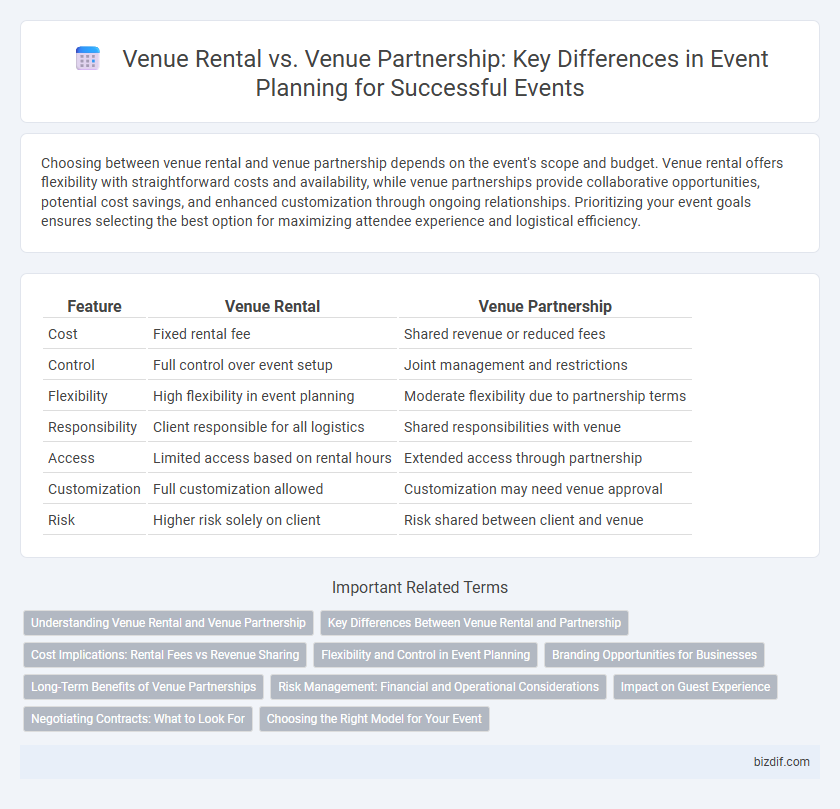Choosing between venue rental and venue partnership depends on the event's scope and budget. Venue rental offers flexibility with straightforward costs and availability, while venue partnerships provide collaborative opportunities, potential cost savings, and enhanced customization through ongoing relationships. Prioritizing your event goals ensures selecting the best option for maximizing attendee experience and logistical efficiency.
Table of Comparison
| Feature | Venue Rental | Venue Partnership |
|---|---|---|
| Cost | Fixed rental fee | Shared revenue or reduced fees |
| Control | Full control over event setup | Joint management and restrictions |
| Flexibility | High flexibility in event planning | Moderate flexibility due to partnership terms |
| Responsibility | Client responsible for all logistics | Shared responsibilities with venue |
| Access | Limited access based on rental hours | Extended access through partnership |
| Customization | Full customization allowed | Customization may need venue approval |
| Risk | Higher risk solely on client | Risk shared between client and venue |
Understanding Venue Rental and Venue Partnership
Venue rental involves booking a space for a specific event date with fixed terms and fees, providing flexibility in vendor choice and event customization. Venue partnership entails a collaborative relationship where event planners and venue owners share responsibilities, resources, and revenue, often leading to cost savings and enhanced service integration. Understanding these models helps planners select the optimal approach based on budget, event scale, and desired control.
Key Differences Between Venue Rental and Partnership
Venue rental involves a straightforward transaction where event organizers pay a fixed fee for temporary access to the space, granting full control over logistics and setup. Venue partnership typically establishes a long-term, collaborative relationship, sharing responsibilities such as marketing, revenue, and operational costs, which can reduce expenses and increase exposure. While rental agreements prioritize independence and simplicity, partnerships emphasize mutual benefits and shared investment in the venue's success.
Cost Implications: Rental Fees vs Revenue Sharing
Venue rental typically involves a fixed fee that can strain event budgets, especially for large-scale functions or extended durations. Venue partnership models often replace upfront costs with revenue sharing agreements, allowing event planners to mitigate initial expenses by sharing profits derived from ticket sales or concessions. Careful evaluation of expected attendance and potential revenue is essential to determine which option optimizes financial outcomes for specific event goals.
Flexibility and Control in Event Planning
Venue rental offers event planners significant flexibility by allowing full control over vendors, setup, and schedule, ensuring customization to specific event needs. Venue partnerships often provide streamlined planning through pre-arranged services and discounted rates but may limit control over certain aspects like catering options and layout. Choosing between rental and partnership depends on the desired balance between autonomy, cost-effectiveness, and access to integrated resources.
Branding Opportunities for Businesses
Venue rental offers businesses flexible branding opportunities through customizable event setups, signage, and targeted guest experiences, allowing full control over brand presentation. Venue partnerships create long-term branding visibility by integrating the business's identity into the venue's marketing, co-branding events, and exclusive promotions, enhancing brand recognition. Both strategies impact brand exposure differently, with rentals providing short-term intensive branding and partnerships fostering sustained community presence.
Long-Term Benefits of Venue Partnerships
Venue partnerships foster sustained collaboration, resulting in preferential rates and customized spaces tailored to recurring events. Long-term partnerships enhance reliability through established trust and mutual understanding, minimizing logistical challenges and ensuring seamless event execution. These alliances often provide exclusive access to venue upgrades, priority booking, and co-marketing opportunities, maximizing value over one-time venue rentals.
Risk Management: Financial and Operational Considerations
Venue rental presents a fixed-cost model with predictable expenses, reducing financial risk but limiting operational control over the space and services. Venue partnerships often involve shared revenue or profit, increasing financial risk yet offering greater influence on event logistics and customer experience. Careful analysis of contract terms and contingency plans is essential to balance financial exposure and operational flexibility in either approach.
Impact on Guest Experience
Venue rental offers exclusive control over the space, enabling tailored event setups that directly enhance the guest experience. Venue partnerships often provide collaborative opportunities and added amenities, resulting in a more seamless experience through shared resources and expertise. Choosing between rental and partnership impacts personalized service levels, event customization, and overall guest satisfaction.
Negotiating Contracts: What to Look For
Negotiating contracts for venue rental requires careful review of rental fees, cancellation policies, and liability insurance to avoid unexpected costs. Venue partnership agreements often include shared revenue terms, exclusivity clauses, and responsibilities for marketing and maintenance, demanding clear definitions to protect both parties. Understanding termination conditions and dispute resolution mechanisms ensures a balanced agreement that supports long-term collaboration and event success.
Choosing the Right Model for Your Event
Selecting the ideal venue model depends on budget flexibility, event scale, and desired control over logistics. Venue rental offers straightforward cost structures and autonomy, ideal for one-time events with specific customization needs. Venue partnerships foster long-term collaboration, often including shared marketing efforts and preferential rates, benefiting recurring or large-scale events.
Venue rental vs Venue partnership Infographic

 bizdif.com
bizdif.com